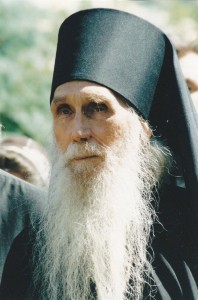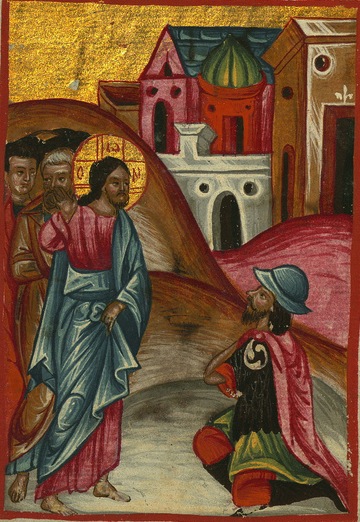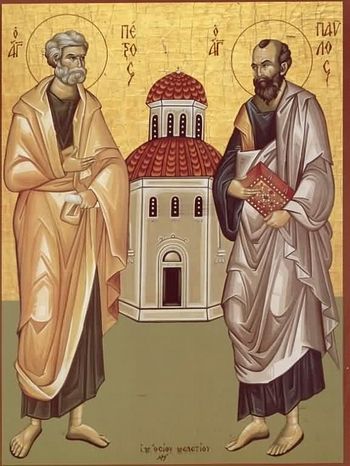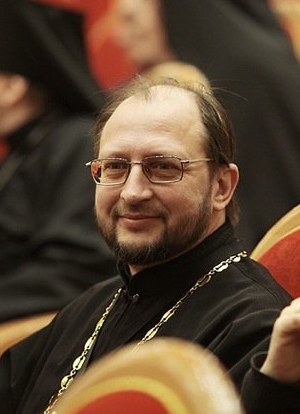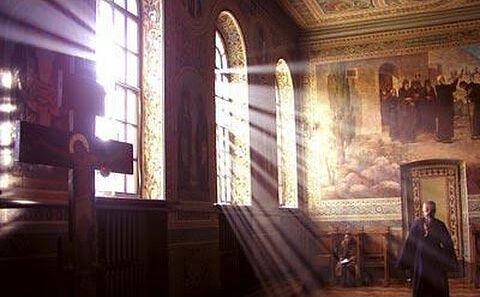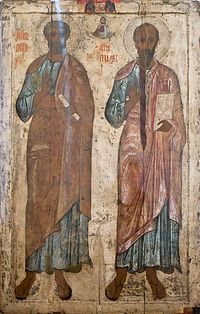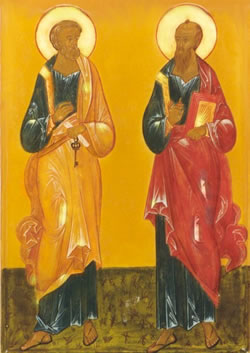And when Jesus was entered into Capernaum, there came unto Him a centurion, beseeching Him, and saying, Lord, my servant lieth at home sick of the palsy, grievously tormented. And Jesus saith unto him, I will come and heal him. The centurion answered and said, Lord, I am not worthy that Thou shouldst come under my roof: but speak the word only, and my servant shall be healed. For I am a man under authority, having soldiers under me: and I say to this man, Go, and he goeth; and to another, Come, and he cometh; and to my servant, Do this, and he doeth it. When Jesus heard it, He marveled, and said to them that followed, Verily I say unto you, I have not found so great faith, no, not in Israel. And I say unto you, that many shall come from the east and west, and shall sit down with Abraham, and Isaac, and Jacob, in the kingdom of heaven. But the children of the kingdom shall be cast out into outer darkness: there shall be weeping and gnashing of teeth. And Jesus said unto the centurion, Go thy way, and as thou hast believed, so be it done unto thee. And his servant was healed in the selfsame hour (Matthew 8:5-13).
Peter’s Confession and the Keys of the Kingdom

Augustine
of Hippo:
The
blessed Peter, the first of the Apostles, the ardent lover of Christ, who was
found worthy to hear, “And I say to you, that you are Peter” (Matthew
16:13-20).
He
himself, you see, had just said, “You are the Christ, the Son of the living
God.” Christ said to him, ”And I say to
you that you are Peter, and upon this rock I will build my Church.”
Upon
this rock I will build the faith you have just confessed. Upon your words, “You
are the Christ, the Son of the living God,” I will build my Church; because you
are Peter.
The Twelve Apostles: Timid Men who Won the World
Saint John Chrysostom
An excerpt from a homily by St. John Chrysostom (Hom. 4, 3.4: PG 61, 34-36).
It became clear through unlearned men that the cross was persuasive; in fact, it persuaded the whole world. Their discourse was not of unimportant matters but of God and true religion, of the Gospel way of life and future judgment, and yet it turned ordinary, uneducated men into philosophers. See how the foolishness of God is wiser than people, and his weakness stronger than people!
Feast of St Peter and St Paul (1) – St Peter’s Healing Repentance
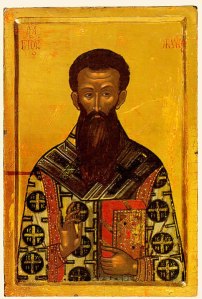
Gregory Palamas:
The first traitor, who incited the first man to desert God, saw Him Who had earlier made Adam, the father of the human race, later re-creating Peter as the father of all true worshippers.
He not only saw, but also heard the Creator saying to Peter: “Thou art Peter, and upon this rock I will build my church” (Matt. 16:18).
Once the prince of evil found this out…, he tempted Peter, the first leader of God’s faithful people, as he had previously tempted Adam, the founder of the race of men.
Becoming New Peters and Pauls
Archpriest Andrei Efanov
From the very beginning of Christ’s proclamation of the glad tidings, the Apostle Peter was right next to the God-Man. He saw the multitude of healings and raisings from the dead that the Lord performed; he was present both on Tabor and in Gethsemane; he received Communion at the Mystical Supper; and he was the first to confess Christ as God.
But except the Lord build the house, in vain do they labour that build it (Psalm 126:1). Simon did not become Peter until the Lord renewed him. His threefold denial of Christ demonstrates that human weakness can be very great.
THE CHRISTIAN PARTHENON AND ST. PAUL
 For those of us who studied the Parthenon in school, there was rarely a mention of its Christian centuries, and in fact, the fifty-page guide to the Acropolis available at the foot of the ruins affords them only two lines. But once you know the temple’s marvelous history, it draws like a magnet. Early in the morning, before the tourist buses arrive, is a wonderful time to climb the steep path leading from the cobbled streets of old Athens to sit atop the Areopagus, the rocky promontory where St. Paul preached so many centuries ago. The modern city falls away at your feet, and behind, as the sun rises in the liquid reds and orange of a Greek dawn, the Parthenon, resplendent even in ruins, stands like a queen, arrayed in her history as one of the most sublime churches of Christendom.
For those of us who studied the Parthenon in school, there was rarely a mention of its Christian centuries, and in fact, the fifty-page guide to the Acropolis available at the foot of the ruins affords them only two lines. But once you know the temple’s marvelous history, it draws like a magnet. Early in the morning, before the tourist buses arrive, is a wonderful time to climb the steep path leading from the cobbled streets of old Athens to sit atop the Areopagus, the rocky promontory where St. Paul preached so many centuries ago. The modern city falls away at your feet, and behind, as the sun rises in the liquid reds and orange of a Greek dawn, the Parthenon, resplendent even in ruins, stands like a queen, arrayed in her history as one of the most sublime churches of Christendom.AKATHIST TO SAINTS PETER AND PAUL
Kontakion I
The Lord Who said of Himself: I am the good Shepherd, said unto thee, O first-enthroned Peter: If thou lovest Me, feed My sheep. And He Who said: I am Jesus, said of thee, O preeminent Apostle Paul: He is a chosen vessel unto Me, to bear My name before the gentiles. And likewise to all your colleagues, His apostles, He said: As My Father hath sent Me, even so send I you; go ye, and teach all nations. And ye, receiving such grace from your good Chief Shepherd, as the foremost shepherds and teachers of all the world, from all misfortunes preserve ye us on the pasture of salvation, that we may cry out to you: Rejoice, O holy first-enthroned Peter and Paul, with all the holy apostles!
Second Sunday after Pentecost Come Follow Me
Matthew 4:18-23
From The Explanation of the Gospel of St. Matthew
by Blessed Theophylact, Archbishop of Ochrid and Bulgaria
Acquire the Love of Paul and you’ll have a Perfect Crown

Saint John Chrysostom
(Saint John Chrysostom: In Praise of the Holy Apostle Paul, III)
Demonstrating the power of human will and the fact that we can fly even to the heavens themselves, leaving the angels and archangels and the other powers, Saint Paul urges believers to become imitators of Christ, sometimes through him (“Become imitators of me, as I am of Christ.”) and sometimes without him (“Therefore become imitators of God, like beloved children.”).
HOMILY ON THE 2ND SUNDAY AFTER PENTECOST – ALL SAINTS OF RUSSIA
Archbishop Andrei (Rymarenko)
Brothers and sisters, today the Holy Church opens before us our native heaven—all the Saints who shone in Russia. They shine as bright stars before us. And the first among them is St. Vladimir. He was a gifted military leader, statesman, a man of penetrating mind and strong will. The political situation among the Russian Slavs required just such a man. Many Slavic tribes were living at that time on the shores of the Dnieper River, and all of them had already been influenced by the Christian message—the dawn of a new life was approaching. Only our forefathers remained pagans. But by that time they too had lost faith in the pagan gods and actually had no religion at all. And the thirst for the One, True, Almighty God more and more strongly took possession of their souls. Vladimir himself was experiencing the same thing: his great soul was tired of the lie and, as a bird from its cage, was straining towards Truth, towards Light.
HOW SHOULD WE OBSERVE THE APOSTLES’ FAST?
By Archpriest Igor Pchelintsev
St. Peter’s Fast, also known as the Apostles’ Fast, is about to begin. We know that it ends on the feast of Sts. Peter and Paul, the Chiefs of the Apostles. We know that this summer fast isn’t as strict as the Great or Dormition Fasts. We know that fresh vegetables make their first appearance during this time of year, which makes the fast quite easy. Unfortunately, however, for many Orthodox Christians this is all this fast amounts to.
Now we should start fasting for a little while… We’ve had our big bash during the week of Pentecost and eaten plenty of non-fasting foods. Now it’s time to fast. For us it’s “business as usual.” We should follow the rules: receive Communion, go to Confession… But for some people this fast doesn’t exist. They say: “This isn’t Great Lent. We don’t have the time (or the strength or energy) to fast ‘all the time.’”
REFLECTIONS IN CHRIST. THE APOSTLES’ FAST
Fr. Stephen Freeman
T
he Orthodox year has a rhythm, much like the tide coming in and going out – only this rhythm is an undulation between seasons of fasting and seasons (or a few days) of feasting. Every week, with few exceptions, is marked by the Wednesday and Friday fast, and every celebration of the Divine Liturgy is prepared for by eating nothing after midnight until we have received the Holy Sacrament.
Prayer, Feasts, and Fasts
Metropolitan Philaret of Eastern American and New York (+1985),
This year the Apostles’ Fast lasts from July 1-11, 2013.
We all understand how important prayer is for the spiritual life of an Orthodox Christian. But how are we to pray? Two forms of prayer are evident in the Orthodox Christian life: private prayers said at home and unified Church prayer. Each has certain special characteristics. Our Savior gave instructions in the Gospel about private prayer: When you pray, go into your room and shut the door, pray to your Father Who is in secret; and your Father Who sees in secret will reward you openly (Matthew 6:6). Of course, home prayers are basic to us. Prayer is deeply intimate and heartfelt. Everyone who has sincerely searched for heartfelt and moving prayer, knows well how easy and natural it is to pray in solitude, in silence and peace. Moreover, our Lord firmly warns us against hypocritical prayer done for show, to elicit praise from people.
A HISTORY OF THE APOSTLE'S FAST
"The Apostles almost always fasted."
Saint John Chrysostom (Sermon 57 on the Gospel of Matthew)
Patristic Testimony Concerning the Fast
The fast of the holy Apostles is very ancient, dating back to the first centuries of Christianity. We have the testimony of St. Athanasius the Great, St. Ambrose of Milan, St. Leo the Great and Theodoret of Cyrrhus regarding it. The oldest testimony regarding the Apostles Fast is given to us by St. Athanasius the Great (†373). In his letter to Emperor Constance, in speaking of the persecution by the Arians, he writes: "During the week following Pentecost, the people who observed the fast went out to the cemetery to pray." "The Lord so ordained it," says St. Ambrose (†397), "that as we have participated in his sufferings during the Forty Days, so we should also rejoice in his Resurrection during the season of Pentecost. We do not fast during the season of Pentecost, since our Lord Himself was present amongst us during those days … Christ’s presence was like nourishing food for the Christians. So too, during Pentecost, we feed on the Lord who is present among us. On the days following his ascension into heaven, however, we again fast" (Sermon 61). St. Ambrose basis this practice on the words of Jesus concerning his disciples in the Gospel of Matthew 9:14, 15: "Can the wedding guests mourn as long as the bridgeroom is with them? The days will come, when the bridegroom is taken away from them, and then they will fast.”
THE FAST OF THE HOLY APOSTLES
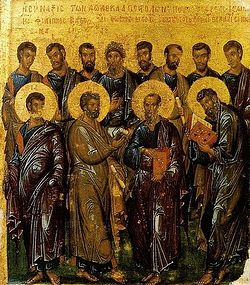 |
and whoever refuses to do so, let him be excommunicated from the Christian community.”
Theodore Balsamon, Patriarch of Antioch (†1204), regarding the Apostle’s Fast.
Origins of the Fast of the Apostles
The Fast of the Holy Apostles is dated back to early years of the church. The first evidence of this fast is found in the writings of St. Athanasius the Great (†373). In his letter to Emperor Constance, he writes:"During the week following Pentecost, the people who observed the fast went out to the cemetery to pray."Some 20 years later, St. Ambrose (†397) writes: “On the days following his ascension into heaven, however, we again fast"(Sermon 61). Later on, St. Leo the Great (†461) writes: "After the long feast of Pentecost, fasting is especially necessary to purify our thoughts and render us worthy to receive the Gifts of the Holy Spirit ... Therefore, the salutary custom was established of fasting after the joyful days during which we celebrated the resurrection and ascension of our Lord, and the coming of the Holy Spirit.''
THE APOSTLES FAST
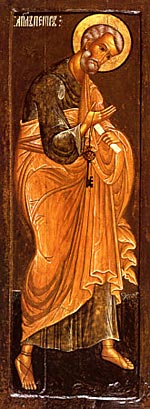
From May 29/ June 11 to June 28/July 11
This summer fast, which we now call the Apostles fast, was earlier called the fast of Pentecost.
The Church calls us to keep this fast according to the example of the holy Apostles, who, having received the Holy Spirit on the day of Pentecost, prepared themselves to preach the Gospels to the whole world.
On the fiftieth day after His rising from the tomb, and the ninth day after His Ascension and sitting at the right hand of the Father, the Lord sent down the Holy Spirit upon all His disciples and Apostles on the day of Pentecost. This is one of the greatest feasts of the Lord. This is the completion of the new, eternal covenant with mankind. When the Holy Spirit came down upon the Apostles, the Spirit of Truth, the Spirit of wisdom and revelation inscribed the new law of Zion in place of the law of Sinai.[1] The law of Sinai gave place to the grace of the Holy Spirit, which confirmed the law [of Moses], and bestowed strength to fulfill the Law of God, which pronounces justification not for works, but by grace.
Being Faithful to the Lord: On the Sunday of All Saints
Brethren, today and tomorrow the special, long liturgical period of year that began several months ago with the Sunday of the Publican and the Pharisee, after which came Great Lent and then Holy Week, comes to an end. All this in fact served as preparation for the great triumph of our Christian faith and hope: the feast of the Luminous Resurrection of Christ, which the Church calls the “Feast of feasts” and the “Triumph of triumphs.” Following this, there came many different liturgical commemorations, mostly connected with Sundays. Tomorrow, finally, is the day that is called the “Sunday of All Saints.”
Fast of the Holy Apostles Peter and Paul
The Podvig of the Apostles' Fast is less strict than during Great Lent: We abstain from eating meat and dairy products throughout the Fast. The Church ustav also provides that, on Mondays, Wednesdaysand Fridays during the Apostles' Fast, we abstain from consuming fish, wine and oil; on the other days of the week, Tuesday and Thursday, we abstain from eating fish. Eating fish is permitted on Saturdays and Sundays, on days commemorating certain great Saints, and on the Feast of the Nativity of St. John the Baptist (7 July).
Teachings of St. Seraphim of Sarov on Fasting
Fasting consists not just of eating rarely, but also of eating little. And not just in eating only one meal, but in not eating much. Foolish is the faster, who waits for a specific time [to eat a meal], but then at the time of the meal is completely consumed, body and mind, with insatiable eating.
In proportion to how the body of the faster becomes thin and light, so the spiritual life attains perfection and reveals itself in wonderful ways. Then the soul acts as if in an incorporeal body. Carnal feelings are shut off, and the spirit, released from the world, ascends to heaven and completely immerses itself in contemplation of the spiritual world.
Every day one should partake of just enough food to permit the body, being fortified, to be a friend and helper to the soul in performing the virtues. Otherwise, with the body exhausted, the soul may also weaken.
Subscribe to:
Posts (Atom)

